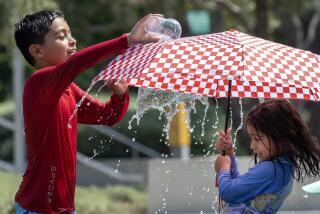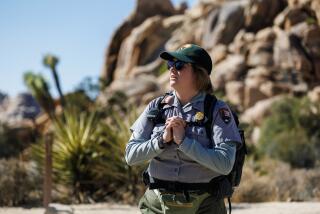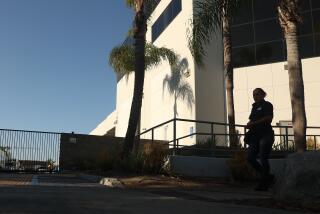As Summer Arrives, U.S. Troops in Iraq Are Boiling but Unbowed
- Share via
BAGHDAD — The heat will chase away the Americans. That was one of the last hopes of Saddam Hussein’s loyalists. Come June, July and August -- when the temperature here routinely soars to Death Valley levels of 110 degrees or higher -- the American soldiers will wilt and run away.
Now the U.S. Army is in Baghdad, its soldiers patrolling dozens of street corners and staffing posts at most government buildings. They bake inside layers of protective clothing and equipment that only a madman would wear in such unrelenting sun. They sweat, but they do not faint. And they are not leaving anytime soon.
Instead, the overdressed American soldiers are becoming part of the summer landscape in this city of 5 million people. It is a summer season like few others in Iraq’s turbulent history, as all the frustrations of postwar chaos and shortages -- and foreign occupation -- are cooked to boiling by the unrelenting Mesopotamian sun.
“Why can’t America, the superpower, get our electricity back to normal?” asked Thamer al Kubaisi, the owner of an ice factory here. The repeated power outages have forced him to cut back production and raise his prices, he said.
“The Americans can take whatever oil they want,” he added. “Just give us reconstruction and security.”
For most Iraqis, the heat only exacerbates the difficulties of everyday life in a still-broken city. Even when the power is on, much of the city’s infrastructure barely functions. Phone service is spotty at best. Driving across the busiest intersections can be an ordeal, with angry commuters stewing in their cars and choking on the dusty Baghdad air, thanks to the absence of traffic signals and traffic police.
Crime is out of control, with carjackings routine. Perhaps as much as half the workforce is unemployed. Untold numbers of former soldiers and government employees -- many of whom have gone unpaid -- stand out in the sun and work as street vendors.
“Yes, it is hot, but I will stay here even if it gets hotter,” Khalaf Zgair says with a frown outside a Baghdad hospital. “What can I do? I served the country for 20 years. Now I sell cigarettes because I have no salary.”
Inside the hospital, administrator Walid Majid said he had grown tired of his staff’s complaints about power outages and overheated emergency and surgery rooms. “We are suffering for a long time,” he said.
At night, some residents sleep on their roofs. Outside a hotel frequented by foreign journalists, a man placed a cot on the roof of a neighboring apartment building one night, and slept there to escape the heat. He crawled out of bed at 6 in the morning when two American helicopters passed overhead.
On Saturday, the first day of summer, an estimated 2,000 Shiite Muslims gathered outside the U.S. military and political headquarters here, demanding a role in the creation of an Iraqi government. Throughout Iraqi history, summer has often been a time of convulsion, with many of the major coups and revolts of the last century occurring during July and August.
In July 1920, Iraqis rose up against the British colonial government. A coup overthrew the Hashemite monarchy in August 1958, and the Baath Party seized power in a July 1968 coup.
For Ayad Ibrahim, standing guard with a sunburned face and a Kalashnikov rifle at the Kathum mosque the day last week when the temperature hit 116 degrees week was no big deal.
“No, the heat does not bother us,” he said. “We are used to it.”
What did bother him, however, was the continued presence of so many American troops in the city. “We want a Muslim government to provide security for us,” he said.
A few moments earlier, a woman in a chador had asked for help: She had just been robbed, not far from the entrance to the mosque. Ibrahim opened his arms wide and explained there was nothing he could do.
Across the city, near the tourism and culture ministries, Mohammed Bakr was also lamenting the crime wave, which was keeping shoppers away from his shop in droves. Despite the heat, hardly anyone was buying his reed hats, a favorite form of sun protection here.
Bakr’s store had been looted in the aftermath of Hussein’s fall. His neighbor’s shop was shuttered, with an empty frame testimony to an air conditioner that had been stolen.
Kubaisi, the ice factory owner, was also frustrated with the Americans, even though they are his biggest customers. He is a native of the city of Fallouja, where U.S. troops killed about 20 protesters in April.
“There were American soldiers drinking in front of a mosque,” he said. “I saw this with my own eyes. This was a provocation.” Still, Kubaisi has no problem selling ice to the Americans, to help them “get used to our weather.”
“They use it for their iceboxes,” he said. “They don’t put it in their water because they think it will make them sick. But Iraqis put it in their drinks.”
A few hours later, a young man with a cart delivered a rectangular block of ice to a group of American military police guarding a police station in the Bayaa neighborhood. Spc. Marcus Arvelo, a military policeman from Brooklyn, N.Y., gladly allowed the young ice seller past the gate and into the guarded compound. All that body armor was, in fact, making Arvelo feel like he was being roasted alive.
“This adds 10 to 20 degrees,” he said, placing his palms on his bulletproof vest. “It’s steel. When you sweat, it makes you hotter. They tell us to have some extra T-shirts around because if you don’t change and let the sweat stay in there, it can start to boil and burn you.”
More to Read
Sign up for Essential California
The most important California stories and recommendations in your inbox every morning.
You may occasionally receive promotional content from the Los Angeles Times.














